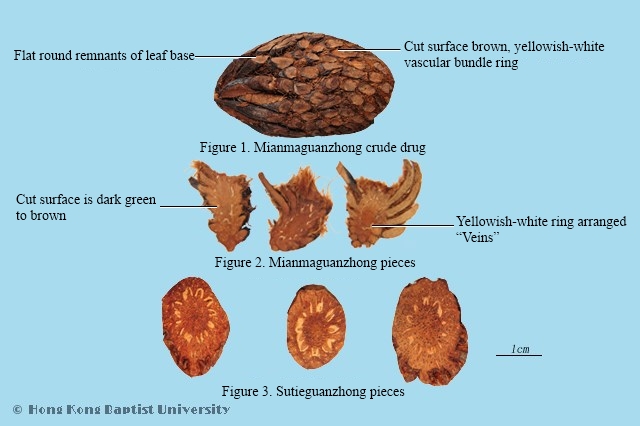Production RegionsPrimarily produced in Inner Mongolia, northeastern China, Hebei, and Gansu.
Macroscopic FeaturesLong inverted oval shape, slightly curved, apex is blunt round or flat, lower portion relatively pointed, some are longitudinally cut into 2 halves, 7~20cm long, 4~8cm diameter. Externally yellowish-brown to blackish-brown, densely arranged remnants of leaf stems and scale leaves, and curved rootlets. Remnants of leaf stem is flat round, 3~5cm long, 0.5~1.0cm diameter; externally has longitudinal ridges, hard and brittle texture, fractured surface is relatively flat, brown, with 5~13 yellowish-white vascular bundles arranged in rings; every remnant of leaf stem has 3 rootlets on the outside, scales are strip-like lanceolate, whole, and often fall off. Hard texture, fractured surface is relatively flat, dark green to brown, with 5~13 yellowish-white vascular bundles arranged in rings, outside has relatively more leaf trace bundles. Distinctive odor, tasteless and slightly astringent, then gradually bitter and acrid.
Quality RequirementsSuperior medicinal material is large, firm, with brownish-green fractured surface of remnants of leaf stems.
PropertiesBitter, slightly cold, little toxic.
FunctionsClears heat, resolves toxin, expels worms, stops blood. Apply to preventing flu, worm stagnation and abdominal pain, metrorrhagia and metrostaxis(use its charcoal form).
Technical Terms'Veins’: This refers to the organization of fiber bundles or vascular bundles within the medicinal material. After the medicinal material is broken, its fiber bundles or vascular bundles present as uneven filaments that look similar to the vessels of the human body, thus they are called ‘veins’. When they appear in an orderly arrangement on the cut surface of the medicinal material, little dotted marks can be seen that are called ‘vein spots (jin mai dian)’. Relatively large marks from vascular bundles are also called ‘vein striations (jin mai wen)’.
OriginThe dried rhizome and remnants of leaf stems of Dtyopteris crassirhiaoma Nakai.(Dryopteridaceae)
